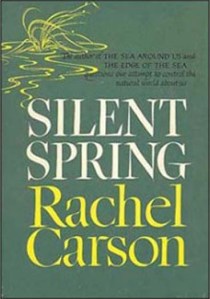20 Books for Aspiring Leaders

I was thumbing through my news feed the other day and I came across 15 Inspiring Books Every Leader Should Not Miss. Living in Arkansas with state representatives sending a letter to Iran and my older male student telling me (his professor) how to drive, I have been thinking about what it means to be a leader. Although the 15 Inspiring Books post opens with a photo of a girl reading a book and recognizes that the stories we read shape the leaders we become, the book selections read like a list of self help books for people pursuing a career in business or interested in learning about famous (white) men.
As an anthropologist and a teacher, I don’t think leadership means – how do I become a CEO? A student recently said to me (I’m paraphrasing here), I’d love to have your job, but I don’t think I can do what you do. I’m not as tough and I don’t want to lose my femininity to be a leader. I was taken aback by this statement. Am I a leader? If so, does that mean I am less feminine. As a female professional in a non-traditional career, I have to make tough choices about how to respond to sexism and inequality. But for me that does not mean I replace the 15 Inspiring Books Every Leader Should Not Miss with 15 Must-Read Books for Women in Leadership. Anyone who has seen Miss Representation knows that young women do not need books like How to Use What You’ve Got to Get What You Want or Nice Girls Don’t Get the Corner Office. Young women (and young people in general) need inspiration and to be able visualize themselves as leaders (as themselves). The student could not see herself as a leader, because the picture of a leader she saw did not resemble her.
Books can help people SEE and IMAGINE themselves as leaders, because they show the diversity of ways that people lead. The top down business model inspires a particular type of leadership model (and there are plenty of books out there for people who are seeking to improve these kinds of skills). But leaders are not just CEOs or politicians; they are teachers, farmers, and activists. They are chefs, managers, and writers. Leaders inspire. They are culturally and socially aware. They know the importance of history and difference. They know how to share power. They recognize that the best model for a good work environment involves communication, collaboration, learning new skills, and the sharing of ideas. Leadership is about giving, not receiving. It is about compassion, passion and determination, strength and courage. For me, it is about working toward positive social change.
There are plenty of books that could be added to this list. But here are a few books that I think have the potential to inspire new leaders.
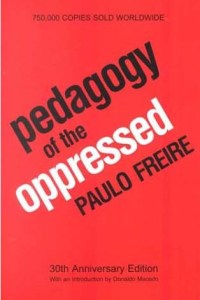 1. Pedagogy of the Oppressed by Paulo Freire. Paulo Freire’s methodology for teaching has helped to empower countless impoverished and illiterate people throughout the world. Freire offers a way to think about learning and living in the world that is critically aware of oppression and works to move beyond the status quo. Pedagogy of the Oppressed has the potential to inspire a new generation of educators, students, and general readers.
1. Pedagogy of the Oppressed by Paulo Freire. Paulo Freire’s methodology for teaching has helped to empower countless impoverished and illiterate people throughout the world. Freire offers a way to think about learning and living in the world that is critically aware of oppression and works to move beyond the status quo. Pedagogy of the Oppressed has the potential to inspire a new generation of educators, students, and general readers.
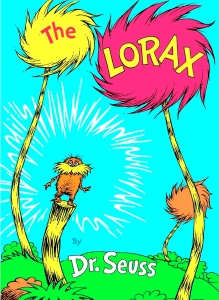 2. The Lorax by Dr. Seuss. Before “going green” became mainstream, Dr. Seuss’s Lorax spoke for the trees and warned of the dangers of disrespecting the environment. In this cautionary rhyming tale, we learn of the Once-ler, who came across a valley of Truffula Trees and Brown Bar-ba-loots (“frisking about in their Bar-ba-loot suits as they played in the shade and ate Truffula Fruits”), and how his harvesting of the tufted trees changed the landscape forever. Dr. Seuss’s classic tale has educated young readers not only about the importance of seeing the beauty in the world around us, but also about our responsibility to protect it.
2. The Lorax by Dr. Seuss. Before “going green” became mainstream, Dr. Seuss’s Lorax spoke for the trees and warned of the dangers of disrespecting the environment. In this cautionary rhyming tale, we learn of the Once-ler, who came across a valley of Truffula Trees and Brown Bar-ba-loots (“frisking about in their Bar-ba-loot suits as they played in the shade and ate Truffula Fruits”), and how his harvesting of the tufted trees changed the landscape forever. Dr. Seuss’s classic tale has educated young readers not only about the importance of seeing the beauty in the world around us, but also about our responsibility to protect it.
3. Silent Spring by Rachel Carson. First published in the New Yorker in 1962, this book, which appeared in September of that year, caused an outcry that forced the banning of DDT and spurred changes in the laws affecting our air, land, and water. Carson’s passionate concern for the environment reverberated powerfully throughout the world, and her eloquent book was instrumental in launching the environmental movement. It is without question one of the landmark books of the 20th century.
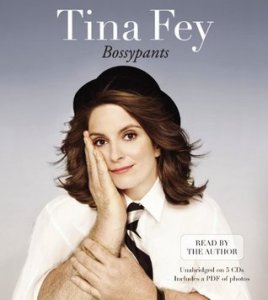 4. Bossy Pants by Tina Fey. Before Liz Lemon, before “Weekend Update,” before “Sarah Palin,” Tina Fey was a young girl with a dream: a recurring stress dream that she was being chased through a local airport by her middle-school gym teacher. She also had a dream that one day she would be a comedian on TV.
4. Bossy Pants by Tina Fey. Before Liz Lemon, before “Weekend Update,” before “Sarah Palin,” Tina Fey was a young girl with a dream: a recurring stress dream that she was being chased through a local airport by her middle-school gym teacher. She also had a dream that one day she would be a comedian on TV.
Tina Fey provides a glimpse into her life – from her youthful days as a vicious nerd to her work on Saturday Night Live; from her halfhearted pursuit of physical beauty to her life as a mother; from her one-sided college romance to her nearly fatal honeymoon. She shows us that you are no one until someone calls you bossy.
5. I, Rigoberta Menchu by Rigoberta Menchu. 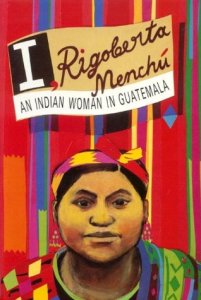 This book recounts the remarkable life of Rigoberta Menchú, a young Guatemalan peasant woman. Her story reflects the experiences common to many Indian communities in Latin America between the 1960s and the 1990s. Rigoberta suffered injustice and hardship in her early life: her parents and brother were murdered by the Guatemalan military. She learned Spanish and campaigned against human rights violations committed by the Guatemalan armed forces.
This book recounts the remarkable life of Rigoberta Menchú, a young Guatemalan peasant woman. Her story reflects the experiences common to many Indian communities in Latin America between the 1960s and the 1990s. Rigoberta suffered injustice and hardship in her early life: her parents and brother were murdered by the Guatemalan military. She learned Spanish and campaigned against human rights violations committed by the Guatemalan armed forces.
The book is a result of interviews conducted by anthropologist Elisabeth Burgos-Debray. After the publication of I, Rigoberta Menchú, anthropologist David Stoll investigated Menchú’s story and claimed that Menchú changed some elements of her life to meet the publicity needs of the guerrilla movement. Historians and anthropologists have critiqued Stoll’s work and pointed out the importance of Menchu’s story for reminding us of people’s human agency, or their ability to act and make change. Rigoberta’s Menchu’s story provides a glimpse into the life of a courageous and passionate woman.
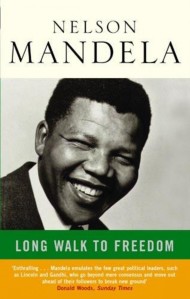 6. Nelson Mandela’s Long Walk to Freedom. Nelson Mandela is an international hero whose lifelong dedication to the fight against racial oppression in South Africa won him the Nobel Peace Prize and the presidency of his country. After his release from more 25 years of imprisonment in 1990, Mandela became the president of the African National Congress and head of South Africa’s anti-apartheid movement; he was instrumental in moving the nation toward multiracial government and majority rule. Long Walk to Freedom is his moving autobiography that tells the extraordinary story of his life–an epic of struggle, setback, renewed hope, and ultimate triumph.
6. Nelson Mandela’s Long Walk to Freedom. Nelson Mandela is an international hero whose lifelong dedication to the fight against racial oppression in South Africa won him the Nobel Peace Prize and the presidency of his country. After his release from more 25 years of imprisonment in 1990, Mandela became the president of the African National Congress and head of South Africa’s anti-apartheid movement; he was instrumental in moving the nation toward multiracial government and majority rule. Long Walk to Freedom is his moving autobiography that tells the extraordinary story of his life–an epic of struggle, setback, renewed hope, and ultimate triumph.
7. Leslie Feinberg’s Stone Butch Blues. 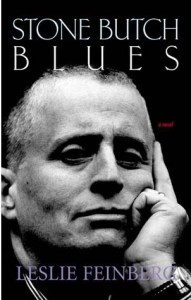 This internationally acclaimed novel looks at the world through the eyes of Jess Goldberg, a masculine girl growing up in the “Ozzie and Harriet” McCarthy era and coming out as a young butch lesbian in the pre-Stonewall gay drag bars of a blue-collar town. Stone Butch Blues traces a propulsive journey, powerfully evoking history and politics while portraying an extraordinary protagonist full of longing, vulnerability, and working-class grit. This once-underground classic takes the reader on a roller-coaster ride of gender transformation and exploration and ultimately speaks to the heart of anyone who has ever suffered or gloried in being different.
This internationally acclaimed novel looks at the world through the eyes of Jess Goldberg, a masculine girl growing up in the “Ozzie and Harriet” McCarthy era and coming out as a young butch lesbian in the pre-Stonewall gay drag bars of a blue-collar town. Stone Butch Blues traces a propulsive journey, powerfully evoking history and politics while portraying an extraordinary protagonist full of longing, vulnerability, and working-class grit. This once-underground classic takes the reader on a roller-coaster ride of gender transformation and exploration and ultimately speaks to the heart of anyone who has ever suffered or gloried in being different.
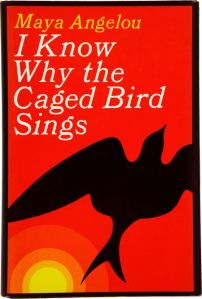 8. I Know Why the Cage Bird Sings by Maya Angelou. Sent by their mother to live with their devout, self-sufficient grandmother in a small Southern town, Maya Angelou and her brother, Bailey, endure the ache of abandonment and the prejudice of the local “powhitetrash.” At eight years old and back at her mother’s side in St. Louis, Maya is attacked by a man many times her age—and has to live with the consequences for a lifetime. Years later, in San Francisco, Maya learns that love for herself, the kindness of others, her own strong spirit, and the ideas of great authors (“I met and fell in love with William Shakespeare”) will allow her to be free instead of imprisoned. Poetic and powerful, I Know Why the Caged Bird Sings will touch hearts and change minds for as long as people read.
8. I Know Why the Cage Bird Sings by Maya Angelou. Sent by their mother to live with their devout, self-sufficient grandmother in a small Southern town, Maya Angelou and her brother, Bailey, endure the ache of abandonment and the prejudice of the local “powhitetrash.” At eight years old and back at her mother’s side in St. Louis, Maya is attacked by a man many times her age—and has to live with the consequences for a lifetime. Years later, in San Francisco, Maya learns that love for herself, the kindness of others, her own strong spirit, and the ideas of great authors (“I met and fell in love with William Shakespeare”) will allow her to be free instead of imprisoned. Poetic and powerful, I Know Why the Caged Bird Sings will touch hearts and change minds for as long as people read.
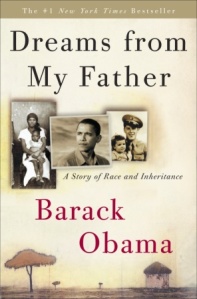 9. Dreams from my Father by Barack Obama. Written before Obama’s 1997 Senate campaign this memoir tells the story of Obama’s struggle to understand the forces that shaped him as the son of a black African father and white American mother. The story opens in New York, where Obama hears that his father has died in a car accident. The news triggers a chain of memories as Barack retraces his family’s unusual history: the migration of his mother’s family from small-town Kansas to the Hawaiian islands; the love that develops between his mother and a promising young Kenyan student, a love nurtured by youthful innocence and the integrationist spirit of the early sixties; his father’s departure from Hawaii when Barack was two; and Obama’s own awakening to the fears and doubts that exist not just between the larger black and white worlds but within himself. As Obama talks about his work as a community organizer in Chicago, his story becomes one with those of the people he works with as he learns about the value of community, the necessity of healing old wounds, and the possibility of faith in the midst of adversity. He travels to Kenya and meets the African side of his family, but also sees a country racked by brutal poverty and tribal conflict whose people are sustained by a spirit of endurance and hope.
9. Dreams from my Father by Barack Obama. Written before Obama’s 1997 Senate campaign this memoir tells the story of Obama’s struggle to understand the forces that shaped him as the son of a black African father and white American mother. The story opens in New York, where Obama hears that his father has died in a car accident. The news triggers a chain of memories as Barack retraces his family’s unusual history: the migration of his mother’s family from small-town Kansas to the Hawaiian islands; the love that develops between his mother and a promising young Kenyan student, a love nurtured by youthful innocence and the integrationist spirit of the early sixties; his father’s departure from Hawaii when Barack was two; and Obama’s own awakening to the fears and doubts that exist not just between the larger black and white worlds but within himself. As Obama talks about his work as a community organizer in Chicago, his story becomes one with those of the people he works with as he learns about the value of community, the necessity of healing old wounds, and the possibility of faith in the midst of adversity. He travels to Kenya and meets the African side of his family, but also sees a country racked by brutal poverty and tribal conflict whose people are sustained by a spirit of endurance and hope.
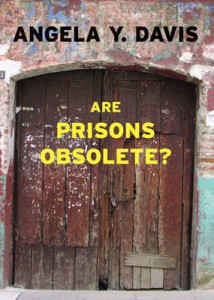 10. In Angela Y. Davis’s Are Prisons Obsolete? she outlines the case for the latest abolition movement in American life: the abolition of the prison. For generations of Americans, the abolition of slavery was sheerest illusion. Similarly,the entrenched system of racial segregation seemed to last forever, and generations lived in the midst of the practice, with few predicting its passage from custom. The brutal, exploitative (and lucrative) convict-lease system that succeeded formal slavery reaped millions to southern jurisdictions. Few predicted its passing from the American penal landscape. Davis expertly argues how social movements transformed these social, political and cultural institutions, and made such practices untenable.Davis illustrates that the time for the prison is approaching an end. She argues forthrightly for “decarceration”, and argues for the transformation of the society as a whole. Davis, who was actively involved in the Civil Rights movement and was incarcerated herself, speaks out about injustice and actively seeks. She challenges us to challenge ourselves, to ask ourselves hard questions and be willing to face up to the difficult and uncomfortable answers.
10. In Angela Y. Davis’s Are Prisons Obsolete? she outlines the case for the latest abolition movement in American life: the abolition of the prison. For generations of Americans, the abolition of slavery was sheerest illusion. Similarly,the entrenched system of racial segregation seemed to last forever, and generations lived in the midst of the practice, with few predicting its passage from custom. The brutal, exploitative (and lucrative) convict-lease system that succeeded formal slavery reaped millions to southern jurisdictions. Few predicted its passing from the American penal landscape. Davis expertly argues how social movements transformed these social, political and cultural institutions, and made such practices untenable.Davis illustrates that the time for the prison is approaching an end. She argues forthrightly for “decarceration”, and argues for the transformation of the society as a whole. Davis, who was actively involved in the Civil Rights movement and was incarcerated herself, speaks out about injustice and actively seeks. She challenges us to challenge ourselves, to ask ourselves hard questions and be willing to face up to the difficult and uncomfortable answers.
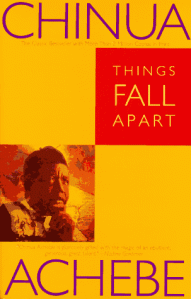 11. Things Fall Apart by Chinua Achebe tells two overlapping, intertwining stories that center around Okonkwo, a “strong man” from an Ibo village in Nigeria. The first of these stories traces Okonkwo’s fall from grace with the tribal world in which he lives, and provides a powerful fable about the conflict between the individual and society. The second story concerns the clash of cultures and the destruction of Okonkwo’s world through the arrival of aggressive, proselytizing European missionaries. Things Fall Apart is an illuminating monument to the African experience. It is a story about cross-cultural contact that everyone should read.
11. Things Fall Apart by Chinua Achebe tells two overlapping, intertwining stories that center around Okonkwo, a “strong man” from an Ibo village in Nigeria. The first of these stories traces Okonkwo’s fall from grace with the tribal world in which he lives, and provides a powerful fable about the conflict between the individual and society. The second story concerns the clash of cultures and the destruction of Okonkwo’s world through the arrival of aggressive, proselytizing European missionaries. Things Fall Apart is an illuminating monument to the African experience. It is a story about cross-cultural contact that everyone should read.
.12. Cesar Chavez: Autobiography of La Causa by Jacques E. Levy.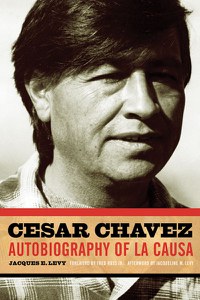 Mexican-American Civil Rights and labor activist Cesar Chavez (1927–1993), comes to life in this vivid portrait of the charismatic and influential fighter who boycotted supermarkets and took on corporations, the government, and the powerful Teamsters Union. Jacques E. Levy interviewed Chavez and the United Farm Workers Union in writing this account of one of the most successful labor movements in history. This book can serve as a guidebook for social and political change.
Mexican-American Civil Rights and labor activist Cesar Chavez (1927–1993), comes to life in this vivid portrait of the charismatic and influential fighter who boycotted supermarkets and took on corporations, the government, and the powerful Teamsters Union. Jacques E. Levy interviewed Chavez and the United Farm Workers Union in writing this account of one of the most successful labor movements in history. This book can serve as a guidebook for social and political change.
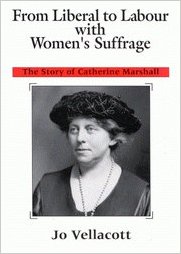 13. From Liberal to Labour with Women’s Suffrage: The Story of Catherine Marshall by Jo Vellacott. By 1913, Catherine Marshall was uniquely placed as a lobbyist, with inside information and sympathetic listeners in every party. Through her the dynamically re-organized NUWSS brought the women’s suffrage issue to the fore of public awareness. It pushed the Labour Party to adopt a strong stand on women’s suffrage and raised working-class consciousness, re-awakening a long-dormant demand for full adult enfranchisement. Had the general election due in 1915 taken place, NUWSS financial and organizational support for the Labour Party might well have been substantial enough to influence the final results. These impressive achievements were forgotten by the time Catherine Marshall died in 1961. This book offers a lens into the suffrage movement in England, but also the ways similar struggles for women’s rights were addressed differently.
13. From Liberal to Labour with Women’s Suffrage: The Story of Catherine Marshall by Jo Vellacott. By 1913, Catherine Marshall was uniquely placed as a lobbyist, with inside information and sympathetic listeners in every party. Through her the dynamically re-organized NUWSS brought the women’s suffrage issue to the fore of public awareness. It pushed the Labour Party to adopt a strong stand on women’s suffrage and raised working-class consciousness, re-awakening a long-dormant demand for full adult enfranchisement. Had the general election due in 1915 taken place, NUWSS financial and organizational support for the Labour Party might well have been substantial enough to influence the final results. These impressive achievements were forgotten by the time Catherine Marshall died in 1961. This book offers a lens into the suffrage movement in England, but also the ways similar struggles for women’s rights were addressed differently.
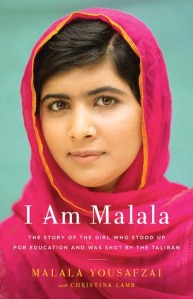 14. I Am Malala: The Girl Who Stood Up for Education and Was Shot by the Taliban by Malala Yousafzai. When the Taliban took control of the Swat Valley in Pakistan, Malala Yousafzai refused to be silenced and fought for her right to an education. On Tuesday, October 9, 2012, when she was fifteen, she almost paid the price with her life. She was shot in the head at point-blank range while riding the bus home from school, and few expected her to survive. Instead, Malala’s miraculous recovery has taken her on an extraordinary journey from a remote valley in northern Pakistan to the halls of the United Nations in New York. At sixteen, she has become a global symbol of peaceful protest and the youngest-ever Nobel Peace Prize laureate. I Am Malala is the remarkable tale of a family uprooted by global terrorism, of the fight for girls’ education, of a father who, himself a school owner, championed and encouraged his daughter to write and attend school, and of brave parents who have a fierce love for their daughter in a society that prizes sons.
14. I Am Malala: The Girl Who Stood Up for Education and Was Shot by the Taliban by Malala Yousafzai. When the Taliban took control of the Swat Valley in Pakistan, Malala Yousafzai refused to be silenced and fought for her right to an education. On Tuesday, October 9, 2012, when she was fifteen, she almost paid the price with her life. She was shot in the head at point-blank range while riding the bus home from school, and few expected her to survive. Instead, Malala’s miraculous recovery has taken her on an extraordinary journey from a remote valley in northern Pakistan to the halls of the United Nations in New York. At sixteen, she has become a global symbol of peaceful protest and the youngest-ever Nobel Peace Prize laureate. I Am Malala is the remarkable tale of a family uprooted by global terrorism, of the fight for girls’ education, of a father who, himself a school owner, championed and encouraged his daughter to write and attend school, and of brave parents who have a fierce love for their daughter in a society that prizes sons.
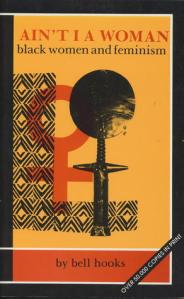 15. Ain’t I a Woman by bell hooks. At nineteen, bell hooks began writing Ain’t I a Woman, a classic analysis of the impact of sexism on black women during slavery, the historic devaluation of black womanhood, black male sexism, racism within the women’s movement, and black women’s involvement with feminism. hooks shows us how to see the world from a different perspective and inspires us to build bridges.
15. Ain’t I a Woman by bell hooks. At nineteen, bell hooks began writing Ain’t I a Woman, a classic analysis of the impact of sexism on black women during slavery, the historic devaluation of black womanhood, black male sexism, racism within the women’s movement, and black women’s involvement with feminism. hooks shows us how to see the world from a different perspective and inspires us to build bridges.
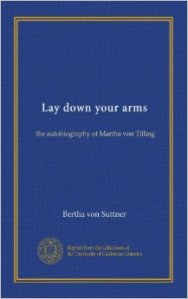 16. Lay Down your Arms by Bertha von Suttner.
16. Lay Down your Arms by Bertha von Suttner.
Baroness Bertha von Suttner, the first woman to be awarded the Peace Prize, wrote one of the nineteenth century’s most influential books, the anti-war novel Lay Down Your Arms in 1889. The title was provocative to many, but the anti-militaristic message caught on. Suttner remind us that leadership isn’t always about leading people into battle. It can also be helping people find peace.
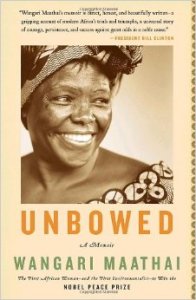 17. Wangari Maathai‘s Unbowed. Born in a rural village in 1940, as a child Wangari Maathai was determined to get an education even though most girls were uneducated. Her memoir tells the story of her education — studying with Catholic missionaries, earning bachelor’s and master’s degrees in the United States, and becoming the first woman both to earn a Ph.D. in East and Central Africa and to head a university department in Kenya. Despite numerous run-ins with the brutal Moi government Maathai establish the Green Belt Movement in 1977. This book illustrates the political and personal reasons that compelled her to help restore indigenous forests while assisting rural women by paying them to plant trees in their villages in Kenya and across Africa. Maathai also served as assistant minister for the environment and as a member of Parliament and was awarded the Nobel Peace Prize in 2004 in recognition of her “contribution to sustainable development, human rights, and peace.” In Unbowed, Wangari Maathai offers an inspiring message of hope.
17. Wangari Maathai‘s Unbowed. Born in a rural village in 1940, as a child Wangari Maathai was determined to get an education even though most girls were uneducated. Her memoir tells the story of her education — studying with Catholic missionaries, earning bachelor’s and master’s degrees in the United States, and becoming the first woman both to earn a Ph.D. in East and Central Africa and to head a university department in Kenya. Despite numerous run-ins with the brutal Moi government Maathai establish the Green Belt Movement in 1977. This book illustrates the political and personal reasons that compelled her to help restore indigenous forests while assisting rural women by paying them to plant trees in their villages in Kenya and across Africa. Maathai also served as assistant minister for the environment and as a member of Parliament and was awarded the Nobel Peace Prize in 2004 in recognition of her “contribution to sustainable development, human rights, and peace.” In Unbowed, Wangari Maathai offers an inspiring message of hope.
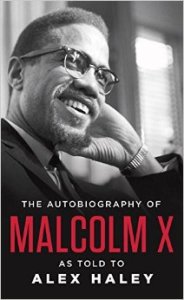 18. The Autobiography of Malcolm X. In the searing pages of this classic autobiography, originally published in 1964, Malcolm X, the Muslim leader, firebrand, and anti-integrationist, tells the extraordinary story of his life and the growth of the Black Muslim movement to veteran writer and journalist Alex Haley. In a unique collaboration, Haley worked with Malcolm X for nearly two years, interviewing, listening to, and understanding the most controversial leader of his time. Raised in Lansing, Michigan, Malcolm Little journeyed on a road to fame as astonishing as it was unpredictable. Drifting from childhood poverty to petty crime, Malcolm found himself in jail. It was there that he came into contact with the teachings of a little-known Black Muslim leader renamed Elijah Muhammad. The newly renamed Malcolm X devoted himself body and soul to the teachings of Elijah Muhammad and the world of Islam, becoming the Nation’s foremost spokesman. When his conscience forced him to break with Elijah Muhammad, Malcolm founded the Organization of Afro-American Unity to reach African Americans across the country with an inspiring message of pride, power, and self-determination. The Autobiography of Malcolm X defines the African American struggle for social and economic equality. Malcolm’s fascinating perspective on the lies and limitations of the American Dream, and the inherent racism in a society that denies its nonwhite citizens the opportunity to dream, gives extraordinary insight into the most urgent issues of our own time.
18. The Autobiography of Malcolm X. In the searing pages of this classic autobiography, originally published in 1964, Malcolm X, the Muslim leader, firebrand, and anti-integrationist, tells the extraordinary story of his life and the growth of the Black Muslim movement to veteran writer and journalist Alex Haley. In a unique collaboration, Haley worked with Malcolm X for nearly two years, interviewing, listening to, and understanding the most controversial leader of his time. Raised in Lansing, Michigan, Malcolm Little journeyed on a road to fame as astonishing as it was unpredictable. Drifting from childhood poverty to petty crime, Malcolm found himself in jail. It was there that he came into contact with the teachings of a little-known Black Muslim leader renamed Elijah Muhammad. The newly renamed Malcolm X devoted himself body and soul to the teachings of Elijah Muhammad and the world of Islam, becoming the Nation’s foremost spokesman. When his conscience forced him to break with Elijah Muhammad, Malcolm founded the Organization of Afro-American Unity to reach African Americans across the country with an inspiring message of pride, power, and self-determination. The Autobiography of Malcolm X defines the African American struggle for social and economic equality. Malcolm’s fascinating perspective on the lies and limitations of the American Dream, and the inherent racism in a society that denies its nonwhite citizens the opportunity to dream, gives extraordinary insight into the most urgent issues of our own time.
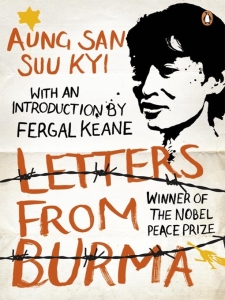 19. Letters from Burma by Aung San Suu Kyi. Aung San Suu Kyi, the winner of the 1991 Nobel Peace Prize, is the inspirational leader of attempts to restore democracy Burma. In these fifty-two pieces, originally written for a Japanese newspaper and begun soon after her release from house arrest, she paints a vivid, poignant yet fundamentally optimistic picture of her native land. She evokes the country’s seasons and scenery, customs and festivities, and describes an inspirational pilgrimage to the Buddhist abbot of Thamanya. She celebrates the courageous army officers, academics and actors who have supported the National League for Democracy, often at great personal risk, and she sets out a comprehensive program for economic reform. A passionate advocate of better health care and education, and the need for ethical foreign investment in Burma’s future, Aung San Suu Kyi reveals an acute insight into the impact of political decisions on ordinary people’s lives.
19. Letters from Burma by Aung San Suu Kyi. Aung San Suu Kyi, the winner of the 1991 Nobel Peace Prize, is the inspirational leader of attempts to restore democracy Burma. In these fifty-two pieces, originally written for a Japanese newspaper and begun soon after her release from house arrest, she paints a vivid, poignant yet fundamentally optimistic picture of her native land. She evokes the country’s seasons and scenery, customs and festivities, and describes an inspirational pilgrimage to the Buddhist abbot of Thamanya. She celebrates the courageous army officers, academics and actors who have supported the National League for Democracy, often at great personal risk, and she sets out a comprehensive program for economic reform. A passionate advocate of better health care and education, and the need for ethical foreign investment in Burma’s future, Aung San Suu Kyi reveals an acute insight into the impact of political decisions on ordinary people’s lives.
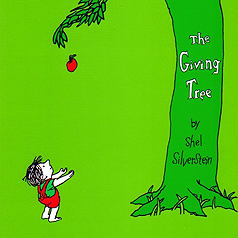 20. The Giving Tree by Shel Silverstein is beautifully written and illustrated. Every day a boy would come to the tree to eat her apples, swing from her branches, or slide down her trunk…and the tree was happy. But as the boy grew older he began to want more from the tree, and the tree gave and gave and gave. This is a tender story, touched with sadness, aglow with consolation. Shel Silverstein has created a moving parable for readers of all ages that offers an affecting interpretation of the gift of giving and a serene acceptance of another’s capacity to love in return.
20. The Giving Tree by Shel Silverstein is beautifully written and illustrated. Every day a boy would come to the tree to eat her apples, swing from her branches, or slide down her trunk…and the tree was happy. But as the boy grew older he began to want more from the tree, and the tree gave and gave and gave. This is a tender story, touched with sadness, aglow with consolation. Shel Silverstein has created a moving parable for readers of all ages that offers an affecting interpretation of the gift of giving and a serene acceptance of another’s capacity to love in return.
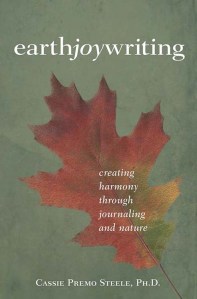 21. Cassie Premo Steele’s Earth Joy Writing draws upon her work as a teacher of writing, literature, and mindfulness to help writers foster a greater connection between the natural world and their own creativity. Earth Joy Writing is a writer’s guide to reconnecting to the earth. In chapters divided by seasons and months of the year, this book guides you through reflections, exercises, meditations, and journaling prompts designed to help you connect more deeply with yourself, others, and your natural surroundings.
21. Cassie Premo Steele’s Earth Joy Writing draws upon her work as a teacher of writing, literature, and mindfulness to help writers foster a greater connection between the natural world and their own creativity. Earth Joy Writing is a writer’s guide to reconnecting to the earth. In chapters divided by seasons and months of the year, this book guides you through reflections, exercises, meditations, and journaling prompts designed to help you connect more deeply with yourself, others, and your natural surroundings.
